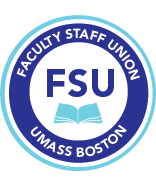The Point: Weaponizing Antisemitism Won’t Protect Any of Us
4/17/2025
Today’s Point is written by Meredith Reiches, Associate Professor of Anthropology.
Let me situate myself. I am an Associate Professor of Anthropology here at UMB, which means that I have the best colleagues. (No shade on any other departments.) I joined the faculty in 2013 after completing a Ph.D. in human evolutionary biology at Harvard, and it has been my good fortune to continue to collaborate with colleagues there. Since 2021, I have also been a candidate for rabbinic ordination at Hebrew College, a pluralistic Jewish seminary in Newton. This means that I have the privilege of being embedded in both secular and religious academic communities. I’m honored to get to speak with you, my colleagues, in The Point.
As Steve Striffler wrote in an essay for Common Dreams, excerpted in The Point, we’re all watching with clenched jaws and spiking blood pressures to see if and how university administrations will resist the federal government’s attempts, in the great tradition of autocracies, to strip away intellectual freedom and ethical autonomy by holding resources hostage. It appeared that Harvard was poised to follow in Columbia’s footsteps when its interim president, Alan Garber, sent a March 31st letter to the community endorsing the government’s assertion that campus antisemitism was rife. In words that were particularly chilling to me, Garber wrote, “I have experienced antisemitism directly, even while serving as president.”
I do not doubt President Garber’s personal experience. Communities within and beyond academia sometimes struggle, particularly since October 7th, 2023, to disambiguate criticisms of Israel’s government from criticisms of the Jewish people. Jewish communities struggle with this, too, our members disagreeing amongst ourselves about what constitutes legitimate critique and what crosses over into injustice. (This guide from T’ruah, a human rights organization comprised of Jewish clergy, is one thoughtful resource for thinking through these distinctions.)
However, by making his statement in a public-facing document announcing the university’s decision to buckle to government pressure, President Garber communicated, intentionally or not, that antisemitism’s reach to the highest levels of power and privilege justifies the kind of indiscriminate crackdown on free speech that results in students and graduates like Mahmoud Khalil, Rumeysa Ozturk, and Mohsen Mahdawi being kidnapped off the street by ICE or illegally detained by DHS during a routine, scheduled interview. President Garber endorsed, intentionally or not, the pressured departure of the director and associate director of the University's Center for Middle Eastern Studies. Intentionally or not, he made a case for legislation like the Antisemitism Awareness Act, which would render many forms of criticism of the State of Israel, including by thoughtful critics who are themselves Israeli Jews, illegal.
This is to say: when one of the most powerful people in academia positions himself as a victim, he writes a blank check for the withdrawal of rights from those who hold less power than he does. He aligns himself and the powerful institution he represents with a form of victimhood that fails to recognize the interconnectedness of his own freedom and safety with the freedom and safety of others, including the world’s Mahmoud Khalils, Rumeysa Ozturks, Mohsen Mahdawis, and growing numbers of students, in Massachusetts and beyond, whose visas the government is revoking. He throws under the bus the freedom of speech of Zionism-critical Jewish organizations like If Not Now and Jewish Voice for Peace. And he does so without guarantees or precedent indicating that concessions will preserve the institution: as we see from Columbia University’s example, capitulation to the current administration only invites further demands for submission.
There are two crucial facts to keep in mind. The first, as mentioned above, is that no group’s freedom or safety can be maintained successfully at the expense of any other’s. Human rights and social justice organizations from the Southern Poverty Law Center to the ACLU and Bend the Arc carry this wisdom into their shared fights against white nationalism and all its identity-based forms of targeted violence, including antisemitism.
The second is that the contemporary federal administration has no genuine investment in combating any form of discrimination against historically marginalized groups, including antisemitism. We cannot let the government claim the mantle of crusaders against antisemitism when they in fact practice it, as historian and scholar of authoritarianism Timothy Snyder reminds us.
In Harvard’s case, there is cause for renewed hope, given President Garber’s response on April 14th to an additional set of demands from the federal government. That list of demands “makes clear,” Garber stated in another letter to the Harvard community, “that the intention is not to work with us to address antisemitism in a cooperative and constructive manner. Although some of the demands outlined by the government are aimed at combating antisemitism, the majority represent direct governmental regulation of the “intellectual conditions” at Harvard.” He announced that “[w]e have informed the administration through our legal counsel that we will not accept their proposed agreement. The University will not surrender its independence or relinquish its constitutional rights.”
May Harvard stand by its statement. May our institutions of higher learning maintain their independence. May they understand that their job is to protect the free speech of all members of their community, including those under the most scrutiny from a power-thirsty government.
On Saturday night, Jews welcomed Passover. This is a festival that reminds us that we were once in a narrow place. (The Hebrew word for Egypt, mitzrayim, means “narrow place.”) It insists that the passage from narrowness to expansiveness, from bondage to freedom, must be undertaken by every generation. May we at UMB be partners, this year and every year, in that journey.
